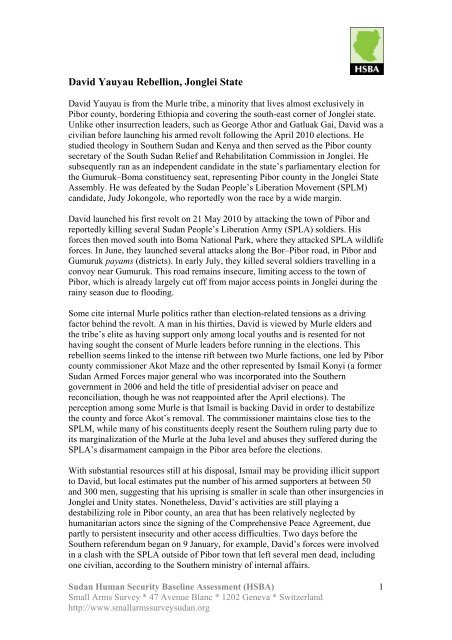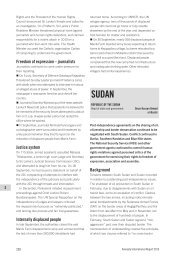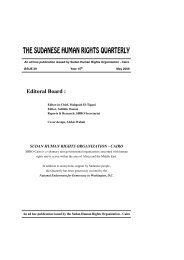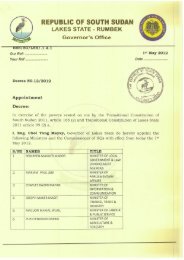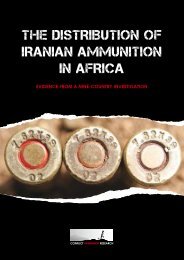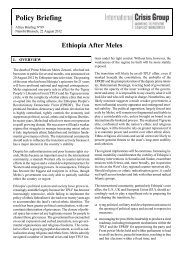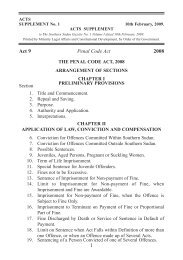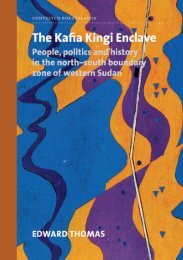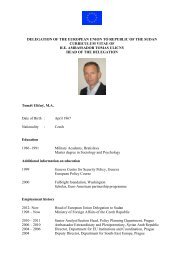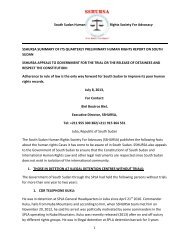David Yauyau Rebellion, Jonglei State - Sudan Tribune
David Yauyau Rebellion, Jonglei State - Sudan Tribune
David Yauyau Rebellion, Jonglei State - Sudan Tribune
- No tags were found...
You also want an ePaper? Increase the reach of your titles
YUMPU automatically turns print PDFs into web optimized ePapers that Google loves.
<strong>David</strong> <strong>Yauyau</strong> <strong>Rebellion</strong>, <strong>Jonglei</strong> <strong>State</strong><br />
<strong>David</strong> <strong>Yauyau</strong> is from the Murle tribe, a minority that lives almost exclusively in<br />
Pibor county, bordering Ethiopia and covering the south-east corner of <strong>Jonglei</strong> state.<br />
Unlike other insurrection leaders, such as George Athor and Gatluak Gai, <strong>David</strong> was a<br />
civilian before launching his armed revolt following the April 2010 elections. He<br />
studied theology in Southern <strong>Sudan</strong> and Kenya and then served as the Pibor county<br />
secretary of the South <strong>Sudan</strong> Relief and Rehabilitation Commission in <strong>Jonglei</strong>. He<br />
subsequently ran as an independent candidate in the state’s parliamentary election for<br />
the Gumuruk–Boma constituency seat, representing Pibor county in the <strong>Jonglei</strong> <strong>State</strong><br />
Assembly. He was defeated by the <strong>Sudan</strong> People’s Liberation Movement (SPLM)<br />
candidate, Judy Jokongole, who reportedly won the race by a wide margin.<br />
<strong>David</strong> launched his first revolt on 21 May 2010 by attacking the town of Pibor and<br />
reportedly killing several <strong>Sudan</strong> People’s Liberation Army (SPLA) soldiers. His<br />
forces then moved south into Boma National Park, where they attacked SPLA wildlife<br />
forces. In June, they launched several attacks along the Bor–Pibor road, in Pibor and<br />
Gumuruk payams (districts). In early July, they killed several soldiers travelling in a<br />
convoy near Gumuruk. This road remains insecure, limiting access to the town of<br />
Pibor, which is already largely cut off from major access points in <strong>Jonglei</strong> during the<br />
rainy season due to flooding.<br />
Some cite internal Murle politics rather than election-related tensions as a driving<br />
factor behind the revolt. A man in his thirties, <strong>David</strong> is viewed by Murle elders and<br />
the tribe’s elite as having support only among local youths and is resented for not<br />
having sought the consent of Murle leaders before running in the elections. This<br />
rebellion seems linked to the intense rift between two Murle factions, one led by Pibor<br />
county commissioner Akot Maze and the other represented by Ismail Konyi (a former<br />
<strong>Sudan</strong> Armed Forces major general who was incorporated into the Southern<br />
government in 2006 and held the title of presidential adviser on peace and<br />
reconciliation, though he was not reappointed after the April elections). The<br />
perception among some Murle is that Ismail is backing <strong>David</strong> in order to destabilize<br />
the county and force Akot’s removal. The commissioner maintains close ties to the<br />
SPLM, while many of his constituents deeply resent the Southern ruling party due to<br />
its marginalization of the Murle at the Juba level and abuses they suffered during the<br />
SPLA’s disarmament campaign in the Pibor area before the elections.<br />
With substantial resources still at his disposal, Ismail may be providing illicit support<br />
to <strong>David</strong>, but local estimates put the number of his armed supporters at between 50<br />
and 300 men, suggesting that his uprising is smaller in scale than other insurgencies in<br />
<strong>Jonglei</strong> and Unity states. Nonetheless, <strong>David</strong>’s activities are still playing a<br />
destabilizing role in Pibor county, an area that has been relatively neglected by<br />
humanitarian actors since the signing of the Comprehensive Peace Agreement, due<br />
partly to persistent insecurity and other access difficulties. Two days before the<br />
Southern referendum began on 9 January, for example, <strong>David</strong>’s forces were involved<br />
in a clash with the SPLA outside of Pibor town that left several men dead, including<br />
one civilian, according to the Southern ministry of internal affairs.<br />
<strong>Sudan</strong> Human Security Baseline Assessment (HSBA)<br />
Small Arms Survey * 47 Avenue Blanc * 1202 Geneva * Switzerland<br />
http://www.smallarmssurveysudan.org<br />
1
This rebellion has received less attention from the leadership of the Government of<br />
Southern <strong>Sudan</strong> (GoSS) than other revolts, probably because it is perceived as a less<br />
significant threat than those led by George Athor and Gatluak Gai. In addition to the<br />
fact that <strong>David</strong> seems to have fewer military and financial resources at his disposal,<br />
his revolt is also less linked to high-level GoSS politics than the other two.<br />
Nonetheless, Murle discontent and general insecurity in Pibor county have proved to<br />
be fertile ground for such a revolt, and the area is one where the SPLA has failed to<br />
assert and extend its authority, beyond the conduct of brutal disarmament campaigns<br />
that have served to stoke local discontent.<br />
In late September 2010, the GoSS entered into talks with <strong>David</strong>, who had requested a<br />
ceasefire through Akot Maze, which was accepted by the SPLA. At that time, the<br />
SPLA claimed that they knew <strong>David</strong>’s whereabouts and could attack him if they so<br />
chose, but that the army wanted the peace talks to succeed. Since then, there has been<br />
no statement from either camp regarding the status of the talks. <strong>David</strong> was not one of<br />
the military officers named in the pardon issued by GoSS President Salva Kiir in<br />
September, but given that he did not serve in the SPLA and that negotiations with him<br />
had already begun before the amnesty offer, this is not surprising.<br />
On 31 October 2010, <strong>David</strong>’s men were reportedly responsible for an armed attack on<br />
civilians who had gathered for a traditional dance ceremony in Gumuruk payam,<br />
Pibor county; there were no reported deaths from this attack, although one police<br />
officer and one civilian were injured. Rumours that talks between him and the<br />
SPLM/A had collapsed and that he may be receiving support from Ismail Konyi<br />
circulated in the aftermath of this incident.<br />
<strong>David</strong>’s area of operation—Pibor county—was included in the 5 January ceasefire<br />
agreement between George Athor and the SPLA, suggesting either a potential alliance<br />
between <strong>David</strong> and George, the presence of George’s men in or near Pibor, or both.<br />
On 25 January 2011, George Athor said in a newspaper interview that the SPLA had<br />
killed three senior generals from <strong>David</strong>’s rebellion ten miles from Pibor town.<br />
According to the interview (reported in a <strong>Sudan</strong>ese paper, Ahram Al-Youm), Athor<br />
considered this violence to be a violation of his own ceasefire agreement. On 28<br />
January, the UN reported it had received information on an attack by <strong>David</strong>’s forces<br />
on the SPLA in Patakang, east of Pibor town. Six of <strong>David</strong>’s men and two SPLA<br />
soldiers were reportedly killed; among those killed from <strong>David</strong>’s camp was a former<br />
sergeant in Ismail Konyi’s Murle militia. Since this incident, no further incidents have<br />
been reported involving <strong>David</strong>’s militia.<br />
Updated February 2011<br />
<strong>Sudan</strong> Human Security Baseline Assessment (HSBA)<br />
Small Arms Survey * 47 Avenue Blanc * 1202 Geneva * Switzerland<br />
http://www.smallarmssurveysudan.org<br />
2


